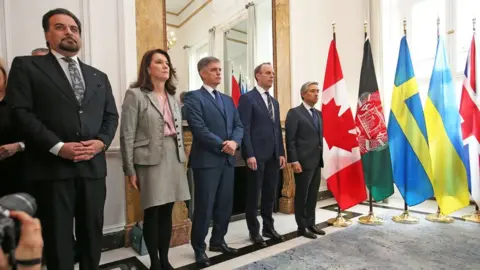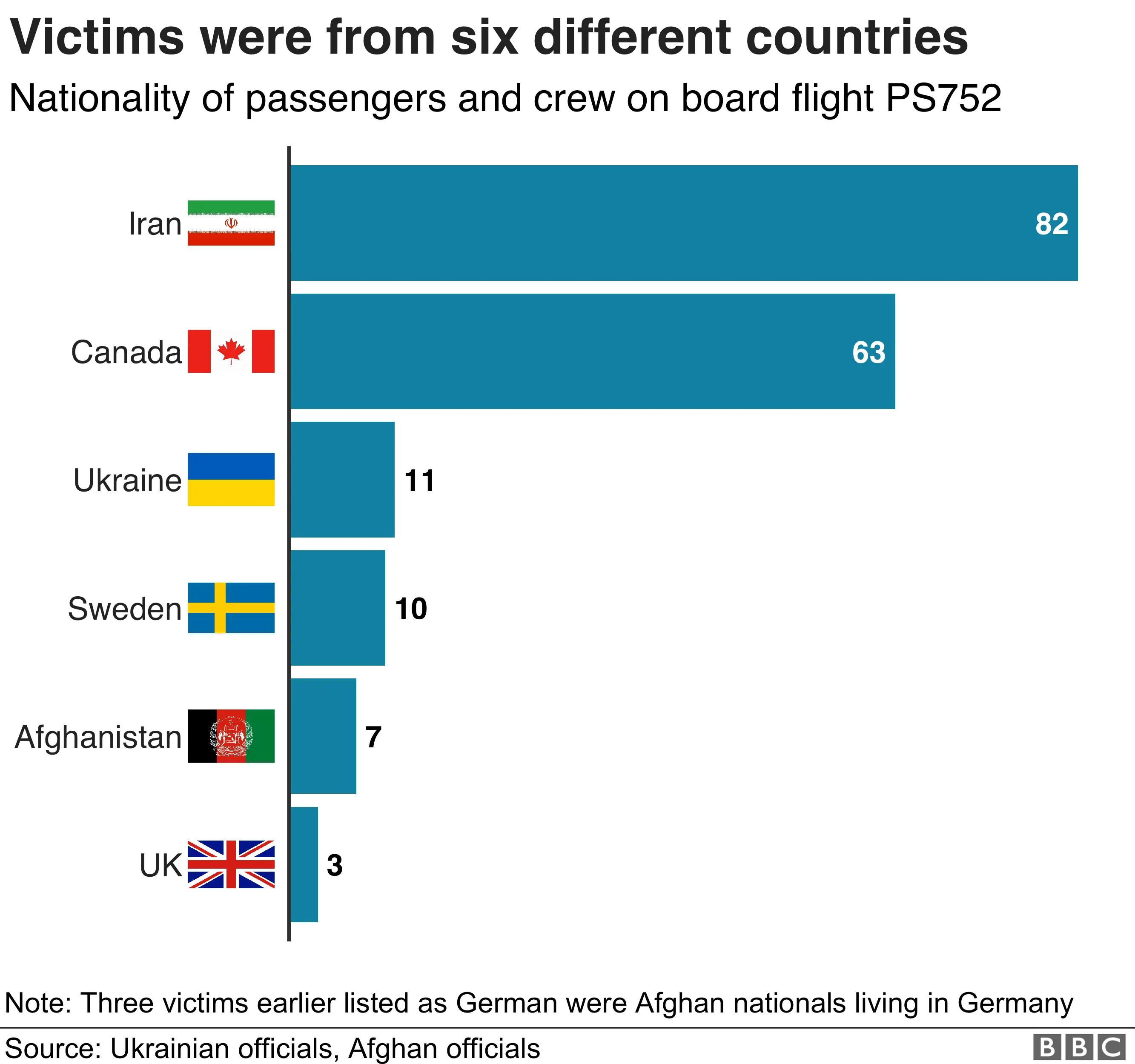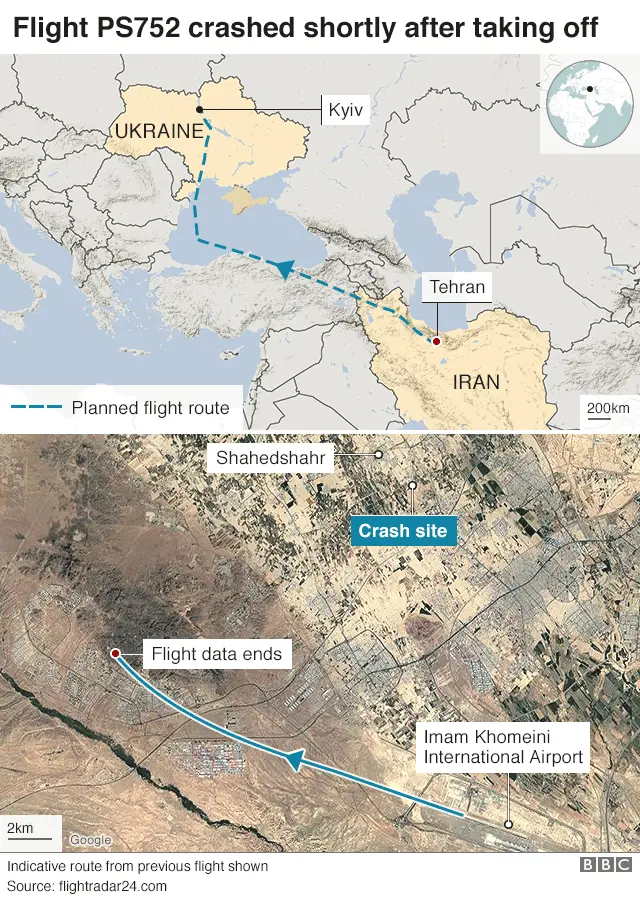Iran plane downing: Victims' governments press Tehran for answers
Iran is facing fresh pressure to give a full accounting of how the Ukrainian plane with 176 people on board was shot down over Tehran last week.
In London, ministers from five nations which lost citizens demanded "full co-operation" from Iran in a transparent international inquiry into the crash.
The foreign ministers of Afghanistan, Britain, Canada, Sweden and Ukraine also said Iran must pay compensation.
Iran has said the plane was brought down by a missile fired in error.
The Ukraine International Airlines Boeing 737-800, travelling to the Ukrainian capital Kyiv and carrying many passengers on their way to Canada, was downed amid escalating tensions between Iran and the US. There were no survivors.
Hours before, Iranian missiles had targeted two airbases in Iraq housing US forces.
For three days after the tragedy Iran denied any responsibility but after international pressure, the hardline Revolutionary Guards admitted that the plane had been mistaken for a "cruise missile" and shot down.
The crisis has come at an extremely sensitive time for Iran, both in terms of its relationship with the international community and at home, where there have been anti-government protests.
What's the meeting in London about?
At a news briefing, the five foreign ministers said they had agreed on five key demands to Iran, including a "thorough, independent and transparent international investigation" and compensation to the victims' families.
Allow X content?

Speaking on behalf the group, Canadian Foreign Minister François-Philippe Champagne said: "We are here to pursue closure, accountability, transparency and justice for the victims - Ukrainian, Swedish, Afghan, British, Canadian as well as Iranian, through a full complete and transparent international investigation.
"In the wake of such a horrific tragedy there are many many questions. Families want answers, all of the countries assembled here today want answers, and the international community want answers. The world is waiting for those answers and we will not rest until we get them."
 PA Media
PA MediaMr Champagne said all those responsible must be brought to justice.
Earlier on Thursday, the five ministers lit memorial candles at the Canadian High Commission in London to honour the victims.
Canada is investigating reports that the families of some victims have been harassed by authorities in Iran and urged to keep quiet.
Many of the foreign nationals killed are believed to have held dual nationality and Canada's government says it is "deeply concerned" about alleged pressure on Iranian-Canadian families not to repatriate remains.
UK Prime Minister Boris Johnson told the BBC on Tuesday that he was "glad" Iran had acknowledged making a "terrible mistake" in shooting down the plane.
"It's good that they've apologised. The most important thing now is that tensions in the region calm down," he added.
Can Iran be held accountable?
Afghanistan, Britain, Canada, Sweden and Ukraine are considering what legal options they might have to hold Iran accountable.
Mr Johnson has said the families of the British victims "deserve justice and closure and we will continue to do everything we can to support them in getting that, including options for compensation".
Iran is creating a special court to oversee the investigation, but victims' families may want to pursue legal judgments elsewhere.


Dozens of the victims are Canadian nationals and there have been calls in Canada for the government to list the Revolutionary Guards as a terrorist entity, paving the way for lawsuits under a 2012 law allowing victims of terrorism to sue state sponsors of terrorism in civil courts.
However, this would involve proving that the plane's downing was an intentional act of terrorism. Even if a case succeeded, claiming any damages awarded would be difficult given most of Iran's non-diplomatic assets in Canada have already been seized to collect damages in other cases.
What's going on in Iran?
On Wednesday, Canadian investigators in Iran visited the site of the crash and examined the plane's wreckage.
They are expecting to be able to participate in the analysis of the plane's black box flight recorders - a key part of figuring out exactly what happened to the plane and how it crashed.
Iran arrested several people over the incident and President Hassan Rouhani said the investigation would be overseen by a "special court", noting that "the whole world will be watching".
The Revolutionary Guards has said a missile operator acted independently and alone, mistaking the plane for a "cruise missile" as there had been reports that such missiles had been fired at Iran after its strikes in Iraq.
But Mr Rouhani has stressed that the "tragic event" should not be blamed on one individual.
On Wednesday, in a sign of friction between the government and the armed forces over the incident, he called on Iran's military to elaborate on how it shot down the plane. His foreign minister, Mohammad Javad Zarif, acknowledged that Iranians had been "lied to" for days but insisted the government was also kept in the dark.
The Revolutionary Guards, a force set up to defend the government after the 1979 revolution, has claimed government officials were alerted soon after the incident.
The shooting down of the plane and its fall-out led to days of protests in some Iranian cities, with demonstrators condemning the authorities for not telling the truth.
Iran is facing pressures on many fronts - its economy is struggling under US sanctions, its most powerful general was recently killed by a US drone strike, and a nuclear deal it signed with world powers looks close to collapse.


